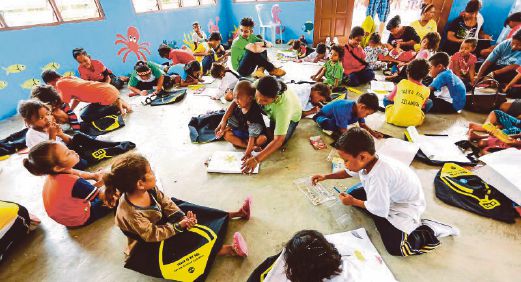There is more to CSR programmes than fulfilling a company’s annual target, writes Aznim Ruhana Md Yusup
IT was nearly midday when I finally found Kampung Orang Asli Sungai Pinang Tambahan in Pulau Indah, Selangor. The village is not too far from Klang, but with ongoing road works and confusing directions from Waze and Google Maps, it took me awhile to get there.
Once I arrived, I saw dozens of Timberland employees in their green T-shirts. Some were painting the community hall — elephants, trees and dragonflies on the outer walls and crabs, corals and dolphins inside.
Others were helping out with the relay games on the badminton court. The Orang Asli children, along with their teachers from SK Pulau Indah, seemed to be having a blast: Loud music from the speakers failed to drown their squeals of delight.
The village is home to about 65 families. Both parents typically work the sea or coast, and given the challenges to make a living, the children would help out whenever they can, leaving them with little time or motivation for school work.
SK Pulau Indah is the nearest school to the village. It has around 1,500 pupils, with only about 50 from the Orang Asli community.
They’re not doing well though: I was informed by one of the teachers that no Orang Asli has passed the UPSR there in 20 years.
ENCOURAGING LEARNING
Timberland is hoping to change that by upgrading the community hall into a resource and reading centre. The kids can go there and read, particularly those in the afternoon session — it is not unusual to miss school because they were dirty from playing (or working) all morning.
There will be activities throughout the year at the centre, organised by the teaching staff at SK Pulau Indah. Meanwhile, Timberland volunteers will assist in these programmes, so it’s a serious commitment for the company.
The kids will get to take part in learning-related contests, which come with prizes like rice, oil and essential foodstuff. It is hoped that when the parents see the benefits of their kids doing well academically, it will encourage them to take education more seriously.
“Education is the key to eradicate poverty,” says Timberland’s assistant marketing manager Karen Ong. “Transforming part of the community hall into a library to encourage the Orang Asli children and help them understand the importance of education is definitely a meaningful act.”
Timberland says it organises two global service events every year. Earth Day in April and Serv-a-palooza like this one in September. Away from the office, but still on company time, the employees pull out their yellow boots to serve the community.
“Being a part of Timberland brand is not always about work,” says Billy Low, a retail controller.
“Through Serv-a-palooza, we give back to the community and this makes our jobs more meaningful. I had a great experience and enjoyed the teamwork among my peers.”
REACH OUT
For the programme in Pulau Indah, Timberland partnered with Reach Out Malaysia. Set up in 2008, the NGO runs a number of aid programmes including daily soup kitchens in central Kuala Lumpur.
Its president Peter Nicoll tells me they have been working with another rural community in Klang for several years. They started by giving the children breakfast, which helped to improve their grades in school.
Providing food alone will create a dependency, he says. “(But) the food is actually a tool. It allows us to get to know who they are.”
So what follows is a dialogue, and when they have a rapport it is much easier to understand the issues faced by the community and how best to resolve them, regardless of whether it is an urban or rural setting.
Meanwhile, Timberland isn’t the only corporation with a Corporate Social Responsibility target, where employees are required to serve a number of hours each year to help out in company-sponsored or sanctioned events.
The initiative has noble intentions but cynics may also view it as a superficial PR exercise. Here, you have a situation where people are essentially forced to do volunteer work, and so it’s not something that Nicoll feels entirely comfortable about.
The way around it, Nicoll tells me, is to make the employees fully understand the significance of the community work that they will be doing.
For Reach Out’s soup kitchen programmes, he limits the CSR participation to a maximum of 15 employees. This way, he can interact with each individual. And the small number means the “volunteers” have no choice but to help out in the operations alongside the regulars.
“It isn’t about turning up at 11 o’clock on a Monday night, distributing 50 packets of food, get the tick and go home. We find that about 50 per cent of the volunteers who come on a CSR programme come back as regular volunteers.”


No comments:
Post a Comment